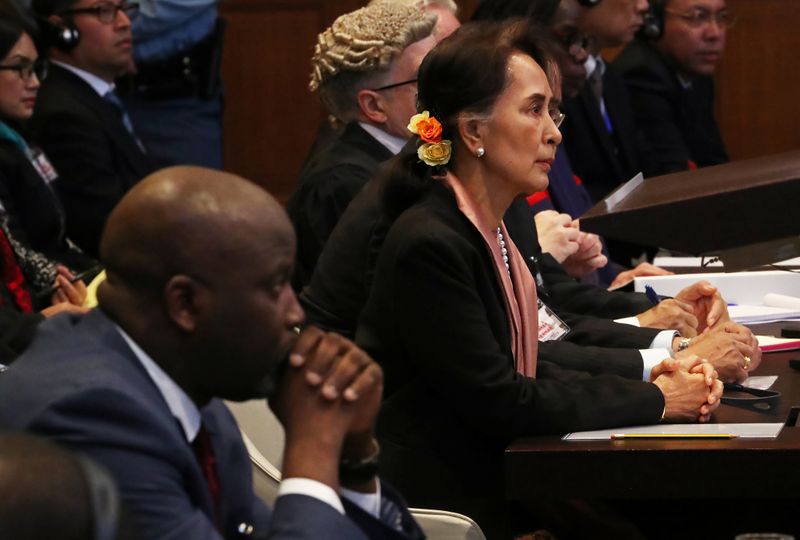By Shoon Naing and Toby Sterling
THE HAGUE (Reuters) - Gambia's legal team described mass rapes, the burning of families in their homes and killing of dozens of Muslim Rohingya children with knives as it set out its genocide case against Myanmar at the U.N.'s International Court of Justice on Tuesday.
Myanmar's leader Aung San Suu Kyi, a Nobel Peace laureate, looked on impassively as the alleged atrocities were detailed at the beginning of three days of hearings in The Hague instituted by Gambia against Buddhist-majority Myanmar in November.
"All that The Gambia asks is that you tell Myanmar to stop these senseless killings," Gambia's Justice Minister Abubacarr Tambadou said in opening comments.
"To stop these acts of barbarity and brutality that have shocked and continue to shock our collective conscience. To stop this genocide of its own people."
Suu Kyi is expected to repeat denials of genocide and argue that military operations launched in August 2017 were a legitimate counterterrorism response to attacks by Rohingya militants on security forces.
Detailing events at the village of Min Gyi, lawyer Andrew Loewenstein drew on witness accounts recorded in a report by U.N. investigators, who estimated 750 people were killed there, including more than 100 children under the age of 6.
"I entered the house with four of my neighbors and three of us had babies," Loewenstein quoted from one survivor's testimony to the U.N. fact-finding mission.
"There were dead bodies on the floor: young boys from our village. As we entered the house, the soldiers locked the door. One soldier raped me. He stabbed me in the back of my neck and in my abdomen. I was trying to save my baby, who was only 28 days old, but they threw him on the ground and he died."
More than 730,000 Rohingya fled Myanmar after the military-led crackdown and were forced into squalid camps across the border in Bangladesh.
The U.N. investigators concluded the military campaign was executed with "genocidal intent".
Myanmar has previously denied almost all allegations made by refugees against its troops, including of mass rape, killings and arson, and promised to punish any soldiers involved in what it says were isolated cases of wrongdoing.
CALLS FOR JUSTICE
Outside the court, dozens of Rohingya demonstrated to demand justice for victims. Hours earlier in Yangon, Myanmar's commercial capital, thousands of people had rallied in support of Suu Kyi.
"It's like Mother Suu went to the frontlines for our country," said 58-year-old Myint Myint Thwin. "Therefore to show our support and that we stand with her we joined this march."
Once feted in the West, Suu Kyi has faced mounting international criticism over the Rohingya crisis. But she has remained popular at home since coming to power 2016 as part of the transition to democracy after decades of military rule.
A Suu Kyi supporter in The Hague, Moe Moe Hnin, said people abroad have been "misinformed" about events in Myanmar. "Yes, military dictators have been committing human rights violations in the whole Burma," she said. "It is not Burma, it is not Burmese people or our religion. We are not racist."
This week's proceedings, before a panel of 17 judges, will not deal with the core allegation of genocide, but Gambia has requested a court order for Myanmar to halt any activity that may aggravate the dispute.
The tiny, mostly Muslim West African country is arguing that Myanmar's forces carried out widespread and systematic atrocities that constituted genocide during what the army called "clearance operations" against militants.
The tribunal has no enforcement powers, but its rulings are final and have significant legal weight.
In the Bangladeshi refugee camps on Tuesday, hundreds gathered on a hilltop and chanted, "Gambia! Gambia!", pumping their fists. Some offered special prayers at mosques in the camps and many others were fasting.

"Our people were killed, our children were thrown into fire, our women were raped, our houses were burnt down. All we want is a fair trial," said Nurul Amin, 30.
(Reporting Toby Sterling, Shoon Naing; Additional reporting by Anthony Deutsch and Stephanie van den Berg in The Hague, Ruma Paul in Cox's Bazar and Sam Aung Moon in Yangon; Writing by Anthony Deutsch; Editing by Gareth Jones and Alex Richardson)